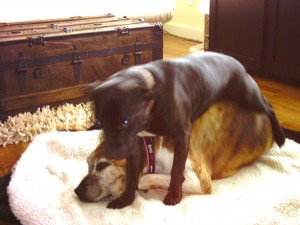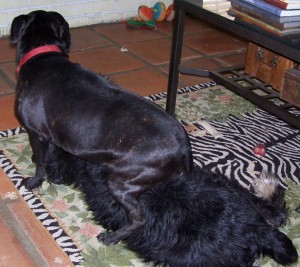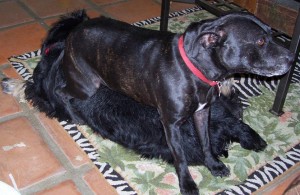Archives for Dogs and Instinct category
Posted on Apr 22, 2010
Behavioral Modification, Dog Humor, Dog Psychology, Dogs and Instinct
Usually when we think of a dog and its instincts, we don’t think in the context of us (dog) versus them (instinct). A dog may never be truly separated from its instincts, however, it may have to grow into them.
While working with puppies, particularly male puppies, it is interesting to observe their response to their instincts particularly as it pertains to their developing hormones. Until the hormones align with maturity, it is as if their instincts work against them. Some males never lift their leg and others…well, could use a father figure saying something like, “son, never pee into the wind.” In the case of some male pups, it would be, “son, lift the other leg.”
I watched as a six-month-old ALL-MALE pup, sniffed a place where another dog had gone, and rather than lifting the leg next to the targeted rock, lifted the wrong leg. Too funny. I, of course, would never laugh at the dog.
I had him out for socialization, and as he focused on the scent where another dog had marked, he began to mark. What was so entertaining, is he doesn’t yet know to ration his urine so he went freely as he was walking away! Another time, he looked down as he was mid-stream and the urine hit his chin. He jumped with a startled expression as if to ask, “who just sprayed me and why?”
He will get his brain soon and his body will mature and the hormones will stabilize. Until then, I will enjoy the maturing process of this beautiful (when he is sleeping) boy.
Posted on Apr 09, 2010
Behavioral Modification, Dog Commands, Dog Psychology, Dog Training, Dogs and Instinct
The secret to keeping your dog safely in the yard is to build a fence! I wish it were easier than that. When we move into a home, it is very clear to us that this is our house and this is our yard. Dogs don’t. They learn where they live, but for the most part, a yard is a yard is a yard.
Some dog breeds have less of a prey drive and are more connected to the needs and wants of their human pack. They may never even consider wandering off unless it is to follow you. Others, appear to go deaf and experience a sudden loss of memory when instinct or wanderlust kicks in. Dogs can be taught the boundary of a yard, but even the best trained dog may run after a foot-loose rabbit. (Can’t you just hear their, “woo-hoo – got me a wabbit! Yard? Boundary? Give me a second!”)
It is very important to continually reinforce their recall (coming to you) because if, or should I say when they take off, they will respond to your call. At that moment, their response to “come” is more important than the fact they left the yard.
Don’t ask me how I know this! =)
Posted on Jan 03, 2010
Adopt a Shelter Dog, Behavioral Modification, Dog Humor, Dog Psychology, Dog Training, Dogs and Instinct, Socialization, Uncategorized
I tried and tried to get the dogs to stay awake to help celebrate the coming of the New Year 2010. As their heads bobbed and soft snoring could be heard around the room, I decided to join them. This year, I would celebrate like dogs do.
They go to bed every night and wake up every morning without a care. They sleep when it’s night (and day) and don’t complain when they wake up – whether it’s in the middle of the night or at the dawn of a day. They don’t get anxious or worry that they didn’t do enough last year or what they will do in the coming year.
While it is not exactly how I see my life going this year, it’s a great way to start every day. Every day is a new day and every new day makes a new year. I looked at the dogs and said, “Thanks for that awareness.” They replied, “What the heck are you talking about…where’s our breakfast?” Enough said. HAPPY NEW YEAR!
Posted on Dec 30, 2009
Barking, Behavioral Modification, Dog Psychology, Dogs and Instinct, Dominant Dog, Protection Dogs
Not all dogs are good at being guard dogs. A barking dog is a huge deterrent to anyone entering a place they aren’t invited to enter. Mac, a large Labradoodle, is boisterous and can be intimidating because of his size; however, I am almost certain his bark is his way of saying, “hey, look at me…I can bark.” End of story. How do you know if you have a guard dog?
Where a dog chooses to lie down and rest, tells you a lot about their protective instincts. Ever notice how they seem to pick the same area or position even when you encourage them to lie elsewhere? Perhaps they choose the foot of the bed rather than snuggling up next to you.
I am not only referring to whether they are on the sofa or on the floor, but rather where they choose to be positioned in relationship to you. If I’m on the computer or seated in a room working, one of my dogs will almost always have her back to me and she is facing out so she can keep a watchful eye on what is happening around us. She instinctively will position herself as the guard.
Another dog, will always have his back to something (a wall or the couch) when lying down. He is able to watch what’s happening around him while keeping his back protected. He is far more concerned about his back than mine!
It is interesting to watch and learn from our dogs as they share their pac k instincts with us. They are paying a lot more attention to their positioning in relationship to us than we may know. My lovely Chapin, a sweet Pit Bull, would have gladly told anyone who cared to break in that I was upstairs and that my purse was in the kitchen, but please don’t make her get up from the chaise lounge.
k instincts with us. They are paying a lot more attention to their positioning in relationship to us than we may know. My lovely Chapin, a sweet Pit Bull, would have gladly told anyone who cared to break in that I was upstairs and that my purse was in the kitchen, but please don’t make her get up from the chaise lounge.
If a guard dog is all you want, maybe you should try a home security system. If you get a dog as a deterrent because of their bark, most will do a good job of that. They will also be a great companion and given healthy attention and guidance, be there for you whether or not they will protect you from all harm.
In this pack, I have what I refer to as the early warning system (barkers) and the backup – the ones who might do more than just bark. I hope I never have to find out!
Posted on Oct 04, 2009
Behavioral Modification, Dog Psychology, Dogs and Instinct, Pit Bull, Timid Dog Behavior
Dogs are similar to us when it comes to needing to feel secure. They may have a past of abuse or may be genetically hard wired to be timid or insecure. Everyone knows and appreciates what it means to hear someone say, “I’ve got your back.” That someone accepts you for who you are; even, or especially when you feel insecure. Olive, a very special Staffordshire Bull Terrier (with an abusive past), was openly insecure and needed someone to have her back in more ways than one.
In her case, it was more that she needed to have someone’s back – literally, to be able to relax and trust what was going on around her. If you don’t think dogs need a connection to feel secure, think again.
In this photo, Olive was finding comfort on her life-long companion, Chapin, who always allowed Olive to find her “calm” while resting on top of Chapin.

After Chapin passed, the next two photos show how Olive tried to find that same security in Zoe. It appears that Olive knew something very valuable – they had her back while she had theirs.


Posted on Oct 01, 2009
Behavioral Modification, Discussion Tab, Dog Psychology, Dog Training, Dogs and Instinct
As a constant observer of dogs, I am still amazed at how shifts in their behavior occur as they mature. It is interesting to see how at times they will appear to be practicing to be dominant. I’ll explain using two separate incidences.
I was working with a dog who is a big fan of chasing anything that moves or may move or used to move! On this occasion, we were making progress with him when I looked down to notice his hackles were up. I couldn’t help but think the timing was off. Something in him triggered this response and he even seemed unsure about his behavior. Natural, though it is, I believe he was in a sense trying out his maturing instincts. The dog didn’t appear to feel threatened. It was either a delayed or premature response. Practice perhaps?
Recently, my own dog who is 18 months of age, kicked up his back legs for the very first time. It was a macho move, but he was awkward and the action appeared misplaced. He looked up at me as if to say, “look, I’m kicking my legs up!” It was like he was practicing for when he would need to show his new-found dominant move. My other thought was that he had witnessed this strut as done by his little (tiny in comparison) brother, who exhibited this macho-manner after nearly every potty break.
I believe they are trying on things much like when you are fortunate enough to see a child as they catch their reflection in a mirror practicing a confident look or pose. It’s not a necessary posture at that moment, but it may be and one needs to be prepared!
As you enjoy the many changes that occur in the life of your dog, watch carefully for those times when they appear to be growing into their instincts.
If your maturing dog is exhibiting new behaviors and you aren’t sure how to handle them, please submit your question in the box to the right (I share it with Melody).












